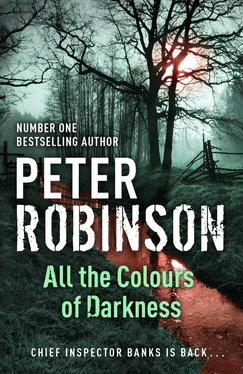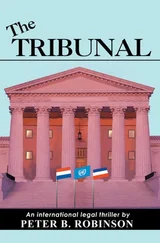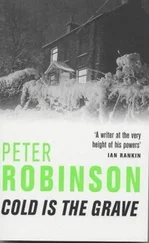Peter Robinson - All the Colors of Darkness
Здесь есть возможность читать онлайн «Peter Robinson - All the Colors of Darkness» весь текст электронной книги совершенно бесплатно (целиком полную версию без сокращений). В некоторых случаях можно слушать аудио, скачать через торрент в формате fb2 и присутствует краткое содержание. Город: London, Год выпуска: 2008, ISBN: 2008, Издательство: Hodder & Stoughton, Жанр: Полицейский детектив, на английском языке. Описание произведения, (предисловие) а так же отзывы посетителей доступны на портале библиотеки ЛибКат.
- Название:All the Colors of Darkness
- Автор:
- Издательство:Hodder & Stoughton
- Жанр:
- Год:2008
- Город:London
- ISBN:978-0-340-83692-7
- Рейтинг книги:5 / 5. Голосов: 1
-
Избранное:Добавить в избранное
- Отзывы:
-
Ваша оценка:
- 100
- 1
- 2
- 3
- 4
- 5
All the Colors of Darkness: краткое содержание, описание и аннотация
Предлагаем к чтению аннотацию, описание, краткое содержание или предисловие (зависит от того, что написал сам автор книги «All the Colors of Darkness»). Если вы не нашли необходимую информацию о книге — напишите в комментариях, мы постараемся отыскать её.
All the Colors of Darkness — читать онлайн бесплатно полную книгу (весь текст) целиком
Ниже представлен текст книги, разбитый по страницам. Система сохранения места последней прочитанной страницы, позволяет с удобством читать онлайн бесплатно книгу «All the Colors of Darkness», без необходимости каждый раз заново искать на чём Вы остановились. Поставьте закладку, и сможете в любой момент перейти на страницу, на которой закончили чтение.
Интервал:
Закладка:
Annie sighed. “This is a Canon camera,” she said, as if explaining to a five-year-old. Though a five-year-old, Banks thought, would probably have known what she was talking about already. “It takes a compact flash card.”
“I know what you’re going to say,” said Banks. “This thing here isn’t a compact flash card.”
“Bingo. It’s a memory stick.”
“Won’t it fit in that camera?”
“No. It’s for Sony digital cameras.”
“Isn’t there an adaptor?”
“No. Not for the camera. I mean, technically I suppose someone could probably do it, but you just wouldn’t. You’d buy the right kind of memory. You can get card readers, and a lot of computers will accept different kinds of cards—Hardcastle’s laptop there does, by the way—but you can’t put a Sony memory stick in a Canon Sure Shot camera.”
“Maybe it was just meant for the computer, not the camera? You said most computers have card readers.”
“Possibly,” Annie said. “But I still think that’s unlikely. Mostly people buy those cheaper USB smart drives when they want portable computer memory. These little thingies are made for cameras.”
“So the question is, what’s it doing here?”
“Exactly,” said Annie. “And where did it come from? Silbert didn’t have a Sony, either. He’s just got an old Olympic. I saw it in his study.”
“Interesting,” said Banks, eyeing the small, wafer-thin stick. “Should we check it out?”
“Fingerprints?”
“Damn.” Banks went to the landing and called one of the SOCOs, who came up, examined and dusted the stick, then shook his head. “Everything’s too blurred,” he said. “It’s almost always the case with things like that. You might get something from the memory stick itself, if you’re lucky, but usually people tend to hold them by the edges.”
“This isn’t the stick?” Banks said, puzzled.
“I forgot to explain,” said Annie. “The stick fits into an adaptor, a kind of sheath, so you can slot it in the computer.”
“Okay. I see.” Banks thanked the SOCO, who went back downstairs. “Let’s have a look at it, then,” Banks went on. “If it’s protected by the sheath, we can’t do it any harm, can we?”
“I suppose not,” said Annie, sitting down at the laptop. Banks watched her slip the stick into a slot in the side of the computer and heard it click into place. A series of dialogue boxes flashed across the screen. Within seconds, he was looking at a photograph showing Laurence Silbert with another man sitting on a park bench. In the background was a magnificent cream-colored, two-domed building. Banks thought they were in Regent’s Park, but he couldn’t be certain.
Next the two men were pictured from behind walking down a narrow street past a row of garages on the right, each a different color painted in a series of distinctive white-bordered square panels, like a chessboard. Above the garages were gabled houses, or apartments, with white stucco fronts.
The final shot showed them entering through a door between two of the garages, which clearly led to the living space above, the unknown man in profile, his hand resting lightly on Silbert’s shoulder. It could have been a simple gesture of courtesy, the man ushering Silbert into the house first. To a jealous lover, though, it could conceivably have appeared as a sign of affection, especially if the lover knew nothing about such a meeting.
Whoever the man was, he certainly wasn’t Mark Hardcastle. Maybe he was Leo Westwood, Banks thought. Whoever he was, he looked about the same age as Silbert, perhaps a year or two younger, given the former’s access to the elixir of youth, and about the same height. Judging by the light and shadows, it was early evening, and beyond the garages, the rest of the houses on the street were brick with cream stucco ground floors and steps leading down to basement entrances. The photos were dated a week ago last Wednesday.
“Okay,” said Banks. “Can we get these printed up back at the station?”
“No, problem,” said Annie. “I can do it myself.”
“Let’s call back there first, then. We’ll show them to the people we’ve already talked to, starting with Edwina Silbert. And I’ve got a pal in technical support who might just be able to identify the street name if he can enhance the image enough. You can see the sign on the wall in the far background. There’s obviously a damn good reason that memory stick was there. It didn’t belong to either Silbert or Hard-castle, and you tell me that neither could have used it in their cameras. I don’t think it was there by coincidence. Do you?”
“No,” said Annie.
Banks pocketed the letters and Annie took the memory stick out of the slot and turned off the laptop. They were just about to head back to the station when Annie’s mobile rang. She answered it immediately. Banks glanced around the room again as she dealt with the call, but saw nothing he thought of any significance.
“Interesting,” said Annie, putting her phone away.
“Who was it?”
“Maria Wolsey, from the theater. She worked with Mark Hardcastle.”
“What does she want?”
“Wants to talk to me.”
“About what?”
“She didn’t say. Just that she’d like to talk to me.”
“And?”
“I said I’d drop by her flat.”
“Okay,” said Banks. “Why don’t we go get the photos printed first, then you can talk to her while I have another chat with Edwina Silbert.”
Annie smiled. “Alan Banks, if I didn’t know any better, I’d say you fancied her.”
5
The morning's rain was long gone by the time Banks got to the Burgundy Hotel, and Edwina Silbert was taking a gin and tonic and a cigarette in the small quiet courtyard, once the stables, at the back of the building. Banks got the impression that it wasn’t her first drink of the day. She had one of the Sunday newspaper style supplements open before her, photos of skinny models in clothes you never saw anyone wearing, but it was clear that she wasn’t really paying attention to it; her gaze was fixed on the line of distant hills framed by a gap in the buildings.
Banks pulled up a chair and sat opposite her. “Comfortable night?” he asked.
“As well as could be expected,” she said. “Do you know, there’s absolutely no smoking anywhere in the hotel? Not even in my own room. Can you believe it?”
“Sign of the times, I’m afraid,” said Banks, ordering a lemon tea from the hovering white-coated waiter. Edwina was looking her age this morning, he thought. Or closer to it. She was wearing a black woolen shawl over her shoulders, a sign of mourning, an indication that she felt cold, or perhaps both. Her gray-white hair and pale, dry skin stood out in stark contrast.
“Where’s that pretty girlfriend of yours today?” she asked.
“DI Cabbot isn’t my girlfriend.”
“Then she’s a damn fool. If I were twenty years younger...”
Banks laughed.
“What? You don’t believe me?”
“Edwina, I believe you.”
Her expression turned serious. “Anything new to report?” she asked.
“Not much, I’m afraid,” said Banks. “I just called in at the station and discovered that your son’s blood type is A positive, along with about thirty-five percent of the population, and that the only blood types we found on Mark’s person were A positive and B positive, which is much rarer, and happens to be his own.”
“So you’re saying it looks more and more as if Mark killed Laurence?”
“We’ve a long way to go to be certain of that yet,” said Banks, “but blood typing certainly supports the theory.”
Edwina sat in silence. Banks felt that she might be debating with herself whether to tell him something, but the moment passed, and when nothing was forthcoming after a minute or so, he slipped the photos Annie had printed out of their envelope and pushed them over to her. “We found these in Mark’s study,” he said. “Any idea who the other man is?”
Читать дальшеИнтервал:
Закладка:
Похожие книги на «All the Colors of Darkness»
Представляем Вашему вниманию похожие книги на «All the Colors of Darkness» списком для выбора. Мы отобрали схожую по названию и смыслу литературу в надежде предоставить читателям больше вариантов отыскать новые, интересные, ещё непрочитанные произведения.
Обсуждение, отзывы о книге «All the Colors of Darkness» и просто собственные мнения читателей. Оставьте ваши комментарии, напишите, что Вы думаете о произведении, его смысле или главных героях. Укажите что конкретно понравилось, а что нет, и почему Вы так считаете.












